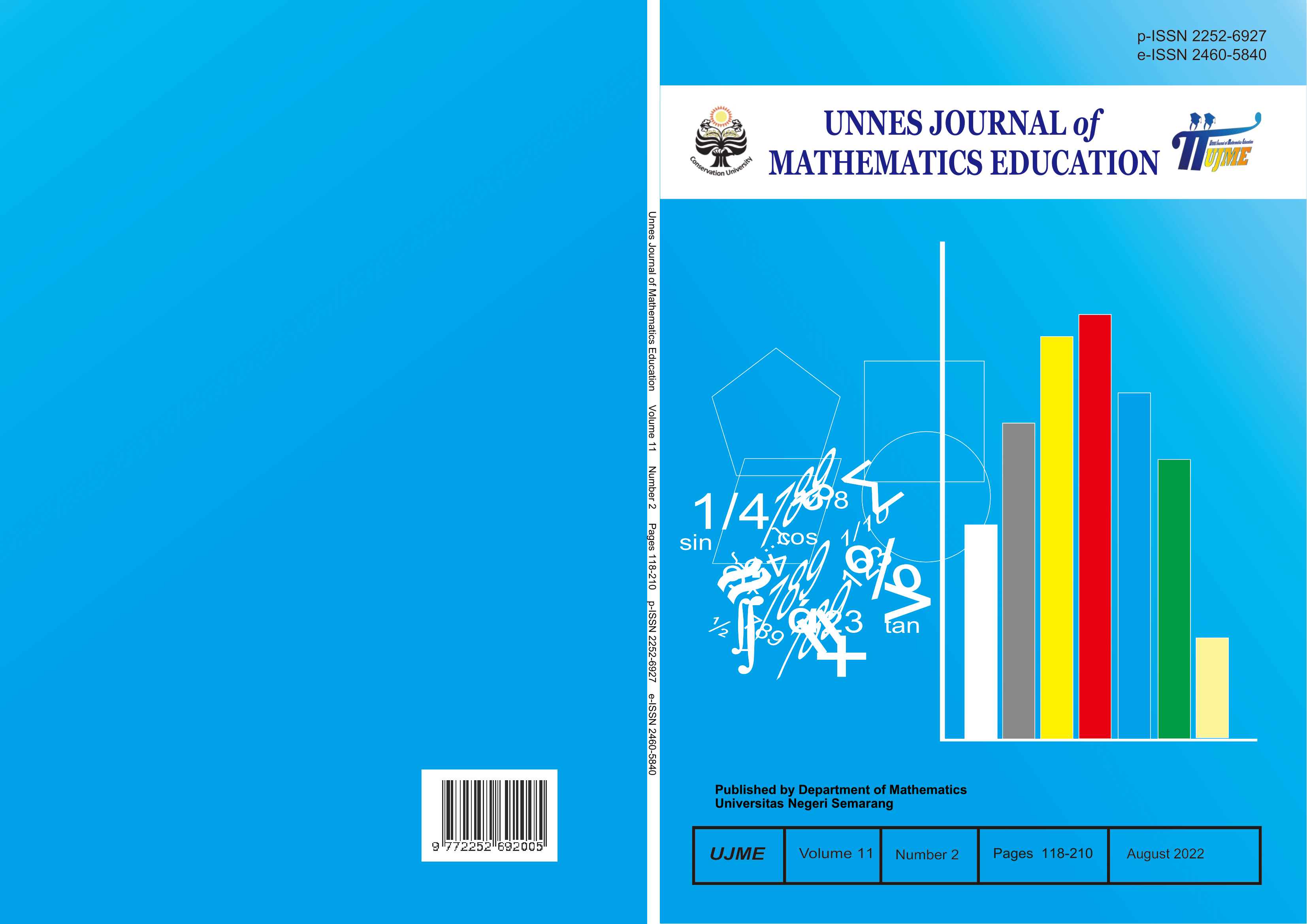Analysis of The Ability to Understand Mathematical Concepts in Terms of Students' Confidence in Blended Learning
##plugins.themes.academic_pro.article.main##
Abstract
The purpose of this study was to determine the effectiveness of the ability to understand mathematical concepts in Blended Learning and to determine the pattern of ability to understand mathematical concepts in terms of students' confidence in Blended Learning. The research method used is experimental research with a sequential explanatory strategy. The population of this study was class VII students of Junior High School 28 Semarang for the academic year 2020/2021, with the research sample being class VII A (experimental class) and class C (control class); sampling was done using a simple random sampling technique. Subjects to obtain quantitative data, namely students from the experimental class, were selected by nine students based on the grouping of the results of the self-confidence questionnaire. The data obtained from the calculation of quantitative data, namely the results of the study, show that Blended Learning is effective for improving students' understanding of mathematical concepts. In the analysis of test results and interviews, triangulation was carried out, namely based on the level of student confidence showing the pattern of students' ability to understand mathematical concepts, namely students with high levels of confidence had good mathematical concept skills, those with moderate confidence levels had sufficient mathematical concept understanding abilities, while students with low self-confidence, lack of mastery of the ability to understand mathematical concepts they have. It can be concluded that the higher the students' self-confidence, the more confident they will be in solving problems with their ability to understand mathematical concepts.
##plugins.themes.academic_pro.article.details##
References
Bibi, S., & Jati, H. (2015). Efektivitas model blended learning terhadap motivasi dan tingkat pemahaman mahasiswa mata kuliah algoritma dan pemrograman. Jurnal Pendidikan Vokasi, 5(1), 74–87. https://doi.org/10.21831/jpv.v5i1.6074
Creswell, J.W. (2014). Research Design: Pendekatan Metode Kualitatif, Kuantitatif, dan Campuran. Translated by Fawaid, A. & Pancasari R.K. 2016. Yogyakarta: Pustaka Belajar
Dini, M., Wijaya, T. T., & Sugandi, A. I. (2018). Pengaruh Self-confidence Terhadap Kemampuan Pemahaman Matematik Siswa Smp. JURNAL SILOGISME : Kajian Ilmu Matematika Dan Pembelajarannya, 3(1), 1. https://doi.org/10.24269/js.v3i1.936
Eriana, E., Kartono, K., & Sugianto, S. (2019). Understanding Ability of Mathematical Concepts and Students’ Self-reliance towards Learning by Implementing Manipulative Props (APM) on Jigsaw Technique. Journal of Primary Education, 8(2), 176-183.
Fatwa, A., & Djunaidi, D. (2015). Strategi blended learning untuk meningkatkan hasil belajar pokok bahasan persamaan dan fungsi kuadrat mata pelajaran matematika. Electronic Journal Politeknik Harapan Bersama Tegal, 1(1), 46-50. Retrieved from https://ejournal.poltektegal.ac.id/index.php/prosiding/article/view/356
Ghufron, N. & R. Risnawita. 2014. Teori-Teori Psikologi. Jogjakarta: Ar-Ruzz Media.
Hasbullah, H. (2014). Pengaruh Metode Belajar Dan Rasa Percaya Diri Terhadap Hasil Belajar Matematika Siswa. AdMathEdu, 4(2), 57331.
Jahani, F., & Behzadi, M. H. (2014). Effect of self-believe of students on educational progress of mathematics. Jurnal Mathematics Education Trends and Research, 2(1), 1-8.
Komara, I. B. (2016). Hubungan antara kepercayaan diri dengan prestasi belajar dan perencanaan karir siswa. Jurnal Psikopedagogia, 5(1), 33-42.
Mulyati, E. S., & Maya, R. (2018). Analisis Kemampuan Pemahaman Matematis Dan Tingkat Kepercayaan Diri Pada Siswa MTs. JPMI (Jurnal Pembelajaran Matematika Inovatif), 1(5), 975-983.
Nugraha, D. G. A. P., Astawa, I. W. P., & Ardana, I. M. (2019). Pengaruh model pembelajaran blended learning terhadap pemahaman konsep dan kelancaran prosedur matematis. Jurnal Riset Pendidikan Matematika, 6(1), 75-86.
Nurfajriyanti, I., & Pradipta, T. R. (2021). Analisis Kemampuan Pemahaman Konsep Matematis pada Materi Bangun Ruang Sisi Datar Ditinjau dari Kepercayaan Diri Siswa. Jurnal Cendekia: Jurnal Pendidikan Matematika, 5(3), 2594-2603.
Patmawati, S., Misdalina., & Fitriasari, P. (2019). Kemampuan Pemahaman Konsep Matematis Siswa Kelas X melalui Model Blended Learning. Histogram: Jurnal Pendidikan Matematika, 3(2), 199 – 209.
Sapto, A. D., Suyitno, H., & Susilo, B. E. (2015). Keefektifan pembelajaran strategi REACT dengan model SSCS terhadap kemampuan komunikasi matematika dan percaya diri siswa kelas VIII. Unnes Journal of Mathematics Education, 4(3).
